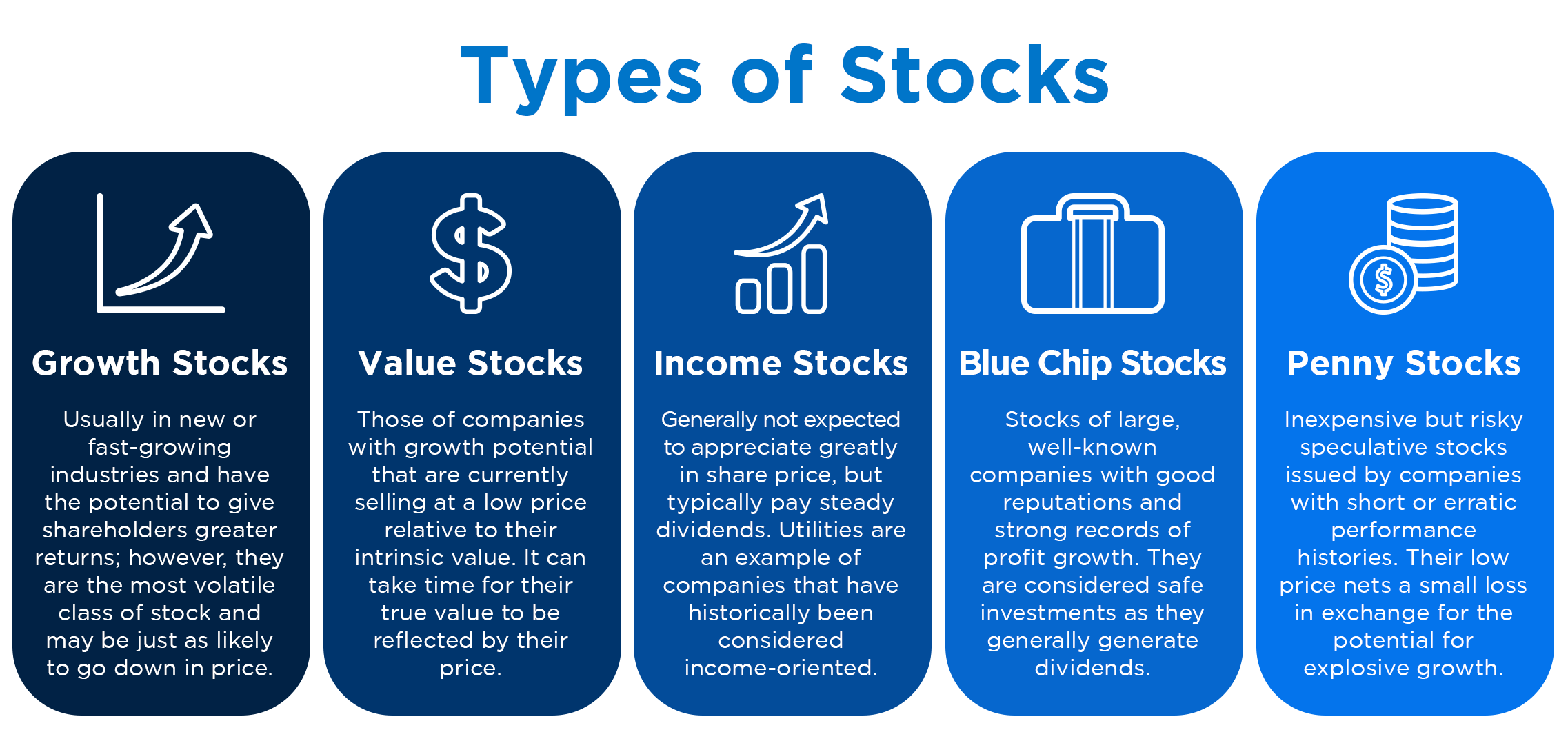

Investing in Stocks
Investing in Stocks
Businesses sell shares of stock to investors as a way to raise money to finance expansion, pay off debt, and provide operating capital. Each share of stock represents a proportional share of ownership in the company. As a stockholder, you share in a portion of any profits and growth of the company. Dividends from earnings are paid to shareholders, and growth is realized by the increase in value of the stock.

Why invest in stocks?
The main reason that investors buy stock is to seek capital appreciation and growth. Although past performance is no guarantee of future results, stocks have historically provided a higher average annual rate of return over long periods of time than other investments, including bonds and cash alternatives. Correspondingly, though, stocks are generally considered to have more volatility than bonds or cash alternatives.
Investment Risks
There are no assurances that a stock will increase in value. Several factors can affect the value of your stocks:
- Actions of investors: If a large number of investors believe that the nation is entering a recession, their actions can affect the direction of the stock market
- Business conditions: A new patent, an increase in profits, a pending merger, or litigation could affect investor interest and stock prices
- Economic conditions: Employment, inflation, inventory, and consumer spending influence the potential profit of a company and its stock price
- Government actions: Decisions on interest rates, taxes, trade policy, antitrust litigation, and the budget impact stock prices
- Global economy: Changes in foreign exchange rates, tariffs, or diplomatic relations can cause stocks to go up or down
All investing involves risks, and there can be no assurance that any investing strategy will be successful. However, understanding these factors can help you make sound investment decisions and keep losses to a minimum.
It is usually best to diversify among the different classifications and not own stock in just one or two companies or industries (though diversification alone cannot guarantee a profit or ensure against a loss).
Buying & Selling Stocks
During an initial public offering (IPO), new issues of stock are sold on the basis of a prospectus (a document that gives details about a company's operation) that is distributed to interested parties. Investment bankers or brokerage houses buy large quantities of the stock from the company and sell them to investors. After the IPO, the stock may trade on a stock exchange or over the counter.
Normally, stock is purchased through a brokerage account. The buy order you place will be directed to the appropriate stock exchange. When someone who owns the stock is willing to sell at the price you are willing to pay, the sale takes place. A commission or fee is charged on your transaction.
Stock certificates may be transferred from one owner to another since they are negotiable instruments. The certificates are issued in the buyer's name or, more typically, held by the brokerage house in street name (i.e., the brokerage firm's name) on behalf of the investor. The advantage of a street-name registration is that if you decide to sell, you do not have to sign and deliver the stock certificates before the sale can be completed. And you don't have to worry about losing the stock certificates.
Read the account agreement
Never sign a document without reading and fully understanding it. Early precautions can prevent later misunderstandings. Keep good records of:
- Documents you sign
- Documents outlining the details of an account or investment
- Periodic account statements
- Transaction confirmations
- Documents verifying an account error was corrected
- Correspondence with your broker or agent
Review these as soon as you receive them. Discuss any discrepancies you find with your broker or agent at once, and follow up on any actions taken until you are satisfied. Never allow your broker or agent to mail statements and transaction confirmations to someone other than you. It's important that you check the accuracy of your own accounts.
Be patient
Some stock investors have made money quickly. But they are the exception rather than the rule. Investing in stocks requires a long-term outlook. Read books, attend seminars, and take advantage of professional advice. Education, good judgment, common sense, and above all, patience increase your chances of achieving your goals.
This article was originally published by Broadridge Investor Communication Solutions, Inc. Copyright 2019.
Are you interested in learning more about investments and financial planning?
We have a series of financial planning webinars lead by Tiffany Yee, CFS* Financial Advisor at Parsons FCU. You can explore a variety of investment topics and access these webinars by going to our website under Planning & Insurance, and clicking on Investment Services. You can also schedule a complimentary financial portfolio review with Tiffany by calling (626) 389-3097 or emailing tiffany.cfsinvest@parsonsfcu.com .
This article originally appeared on Broadridge. Copyright 2019.
*Non-deposit investment products and services are offered through CUSO Financial Services, L.P. (“CFS”), a registered broker-dealer (Member FINRA/SIPC) and SEC Registered Investment Advisor. Products offered through CFS: are not NCUA/NCUSIF or otherwise federally insured, are not guarantees or obligations of the credit union, and may involve investment risk including possible loss of principal. Investment Representatives are registered through CFS. The Credit Union has contracted with CFS to make non-deposit investment products and services available to credit union members.
If you're using a screen reader or other auxiliary aid
and having problems using this web site,
please call 800-765-4527 for assistance.





